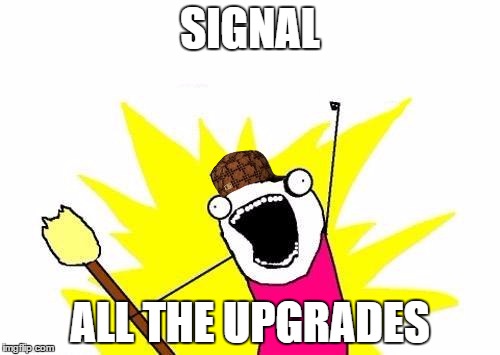BldSwtTrs
Active Member
- Sep 10, 2015
- 196
- 583
Shit small blockers say:
*They think the "Nakamoto consensus" is something else than the consensus algorithm describes by Satoshi Nakamoto in the whitepaper published on October 31, 2008.
**They think "economic majority" is somehow a meaningful concept. It doesn't bother them the least that the economic majority is using fiat currencies.
They basically have not a fucking clue of what Bitcoin is.
------------------------------------------------------------------------
Bitcoin is the ledger. Nakamoto consensus is the consensus algorithm that allows the ledger to converge.
The ledger has value because of a social phenomena which has nothing to do which "economic majority" but which is more accurately described with the concept of "network effect".
When one thinks in terms of economic majority it favors the status quo conclusion. High rank people (ie. the economic majority) don't have interest to challenge the current state of things since they are already at top of the ladder.
When one thinks in terms of network effect it favors the growth pathway. Growth threatened established positions.
If POW coins are the ones at the higher positions on coinmarketcap it's because POW is a consensus algorithm which favors the network effect, while POS is a consensus algorithm which hinders it. The debate focusing on the technical merits of both misses the most important point.
*They think the "Nakamoto consensus" is something else than the consensus algorithm describes by Satoshi Nakamoto in the whitepaper published on October 31, 2008.
**They think "economic majority" is somehow a meaningful concept. It doesn't bother them the least that the economic majority is using fiat currencies.
They basically have not a fucking clue of what Bitcoin is.
------------------------------------------------------------------------
Bitcoin is the ledger. Nakamoto consensus is the consensus algorithm that allows the ledger to converge.
The ledger has value because of a social phenomena which has nothing to do which "economic majority" but which is more accurately described with the concept of "network effect".
When one thinks in terms of economic majority it favors the status quo conclusion. High rank people (ie. the economic majority) don't have interest to challenge the current state of things since they are already at top of the ladder.
When one thinks in terms of network effect it favors the growth pathway. Growth threatened established positions.
If POW coins are the ones at the higher positions on coinmarketcap it's because POW is a consensus algorithm which favors the network effect, while POS is a consensus algorithm which hinders it. The debate focusing on the technical merits of both misses the most important point.
Last edited:

